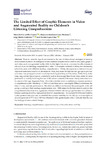The Limited Effect of Graphic Elements in Video and Augmented Reality on Children’s Listening Comprehension

Ver/
Use este enlace para citar
http://hdl.handle.net/2183/36924Coleccións
- GI-GIRAP - Artigos [53]
Metadatos
Mostrar o rexistro completo do ítemTítulo
The Limited Effect of Graphic Elements in Video and Augmented Reality on Children’s Listening ComprehensionAutor(es)
Data
2020-01-10Cita bibliográfica
Del Río Guerra, M.S., Garza Martínez, A.E., Martin-Gutierrez, J. and López-Chao, V. (2020). Applied Sciences 10(2), 527. https://doi.org/10.3390/app10020527
Resumo
[Abstract]
There is currently significant interest in the use of instructional strategies in learning environments thanks to the emergence of new multimedia systems that combine text, audio, graphics and video, such as augmented reality (AR). In this light, this study compares the effectiveness of AR and video for listening comprehension tasks. The sample consisted of thirty-two elementary school students with different reading comprehension. Firstly, the experience, instructions and objectives were introduced to all the students. Next, they were divided into two groups to perform activities—one group performed an activity involving watching an Educational Video Story of the Laika dog and her Space Journey available by mobile devices app Blue Planet Tales, while the other performed an activity involving the use of AR, whose contents of the same history were visualized by means of the app Augment Sales. Once the activities were completed participants answered a comprehension test. Results (p = 0.180) indicate there are no meaningful differences between the lesson format and test performance. But there are differences between the participants of the AR group according to their reading comprehension level. With respect to the time taken to perform the comprehension test, there is no significant difference between the two groups but there is a difference between participants with a high and low level of comprehension. To conclude SUS (System Usability Scale) questionnaire was used to establish the measure usability for the AR app on a smartphone. An average score of 77.5 out of 100 was obtained in this questionnaire, which indicates that the app has fairly good user-centered design.
Palabras chave
Listening comprehension
Augmented reality
Video
Education
Usability
Augmented reality
Video
Education
Usability
Versión do editor
Dereitos
Atribución 3.0 España
ISSN
2076-3417






